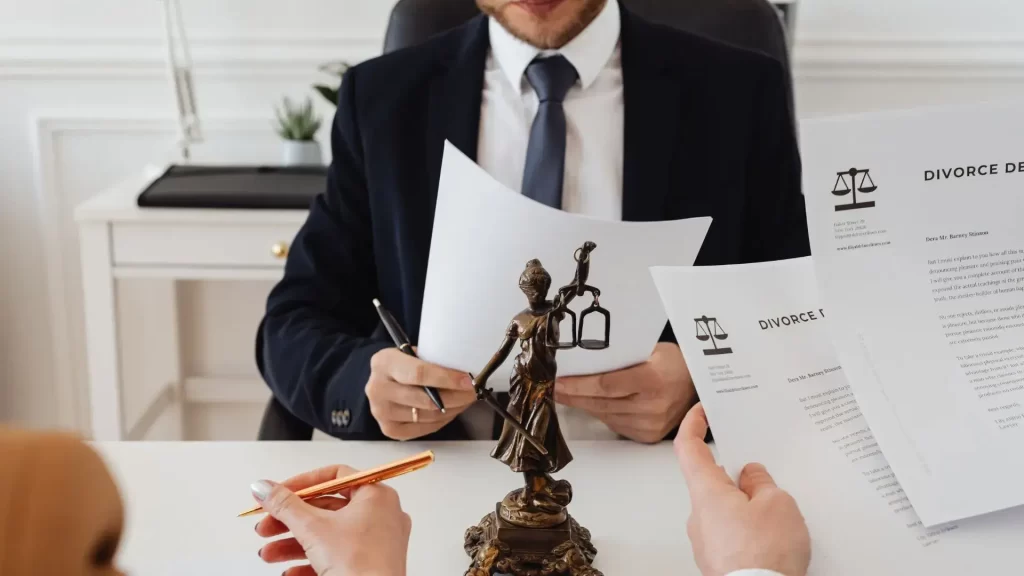For anyone wishing to pursue a career in law or who is just generally interested in the legal profession, understanding their roles and responsibilities of an Esquire is essential.
In this article, I will walk you through the fundamental roles and responsibilities of an Esquire in order to shed light on the numerous tasks that Esquires carry out in order to assist lawyers and the legal system as a whole.
Esquires serve a crucial part in the legal process and you should have the clear concept, helping lawyers with everything from client interaction to document preparation and research assistance.
You can use the table of content below and navigate around the topic of your interest.
Let’s Begin…
An Esquire, abbreviated as “Esq.,” is a professional title frequently used in the legal sector to refer to people who have earned a Juris Doctor (J.D.) degree and are authorized to practice law.
Even though the name “Esquire” is more frequently used in the US, it is recognized and understood in many different legal systems around the world.
Definition of an Esquire
A lawyer who has successfully completed their legal education and aced the bar exam is known as an Esquire or Lawyer Esquire.
This title signifies that the person is an attorney and has the necessary credentials to provide legal services.
The term “Esquire,” however, is not universally used in all jurisdictions, and its use may differ depending on the nation or location.
Esquire Title
The title “Esquire” is an honorific that is traditionally used in English-speaking countries, primarily in the United Kingdom and the United States. Commonly used as a courtesy title following a person’s name to denote their status as a lawyer or barrister, it is commonly abbreviated as “Esq.”
In the past, “Esquire” referred to a landowner who was not a knight and was associated with the English gentry. Its significance changed over time, and today it is commonly associated with the legal industry. These days, lawyers primarily use it as a professional title.
There is no legal restriction on who may use the title “Esquire” in the United States, hence anyone may do so, whether or not they are a lawyer in practice. As a professional designation, it is most commonly used by lawyers. It is frequently used in professional correspondence, on letterheads, and on business cards in the legal industry.
The title “Esquire” is often reserved for barristers in the UK and is not as commonly used. Barristers’ profession is denoted by this following their names. Solicitors do not frequently use the title “Esquire” in the British legal system.
It’s crucial to remember that the title “Esquire” can be used in a variety of ways depending on the jurisdiction and may have different meanings in other nations. While it is primarily associated with the legal profession in some contexts, it may also be used more broadly as a general courtesy title.
The title “Esquire” is primarily used to address or refer to a lawyer or barrister in a respectful and professional manner.
Education and Training Requirement

One must successfully complete a demanding educational course to become an Esquire.
This typically entails earning a Bachelor’s degree before enrolling in a law school in the United States that has been approved by the American Bar Association (ABA).
Graduates earn their Juris Doctor degree after three years of law school. The voyage doesn’t finish there, though.
To become certified lawyers, aspiring esquires must pass the bar exam in their particular jurisdiction.
Role of an Esquire
The term “Esquire” refers to a person who plays a role in the legal system and is responsible for a variety of responsibilities that are essential to its effective operation.
Let’s take a closer look at some of the most important responsibilities that Esquires have performed.
✅ Assisting Attorneys
Esquires frequently work closely with attorneys, offering helpful assistance in a range of legal situations.
They aid in carrying out legal research, studying case materials, and examining pertinent statutes and case law.
Attorneys can use this support to strengthen their legal arguments and make well-informed conclusions.
✅ Legal Research and Writing
Conducting thorough legal research is one of an Esquire’s primary responsibilities. To obtain pertinent facts for ongoing cases, they pore over legal databases, court decisions, and academic articles.
Esquires also excel at legal writing, producing memos, briefs, and other legal documents that present their conclusions and support the arguments made by the attorney.
✅ Document Preparation
Esquires are in charge of drafting numerous legal documents required for the development of a case.
They prepare court documents such pleadings, motions, and other court files, making sure they are properly formatted and include the required legal language.
Because even the tiniest inaccuracy or omission can have a substantial impact on a case, esquires are careful in their attention to detail.
✅ Client Interaction
In dealing with clients, esquires also play a significant role. They visit with clients to learn more about them, talk about potential legal defences, and provide them updates on how their cases are doing.
Esquires need to be able to communicate effectively with clients who may not have a background in the law in order to explain complicated legal issues in a way that is clear and understandable.
✅ Courtroom Support
Esquires offer crucial support in the courtroom during a trial. They support attorneys by helping to prepare witnesses for testimony, arrange trial exhibits, and keep the proceedings moving smoothly.
Under the direction of the attorney, esquires may also present evidence or make arguments in support of motions in court.
Responsibilities of an Esquire
![Role and Responsibilities of an Esquire [ Esquire Title, Esquire Definition & More ]](https://thelegalstories.com/wp-content/uploads/2023/05/shutterstock_1038948943-1.webp)
Esquires, in addition to their support role for attorneys, have a variety of other responsibilities that are important to the overall outcome of legal issues.
Let’s look at some of the most important responsibilities, shall we?
📝 Case Management
Esquires are involved in the management of cases from the very beginning to the very end.
They arrange and maintain the case files, ensuring that all pertinent documents are filed in the appropriate location and can be accessed without any difficulty.
To ensure that cases proceed in a timely and orderly manner, esquires monitor essential dates and deadlines, including court appearances and other significant days and times.
📝 Legal Analysis
Esquires are highly competent in the process of doing legal analysis, which involves researching relevant statutes, regulations, and case law in order to evaluate the benefits and drawbacks of a particular case.
They discover prospective legal concerns and offer recommendations to attorneys, which helps in the process of developing efficient legal strategy.
📝 Drafting Legal Documents
Esquires are exceptionally skilled in the art of drafting a myriad of legal documents, such as contracts, agreements, and recommendations for settlements.
Their painstaking attention to detail guarantees that these documents are legally sound, thereby preserving the interests of their customers.
📝 Witness Preparation
When it comes to preparing witnesses for their testimony in depositions or trials, esquires play a crucial role.
They ensure that the evidence of the witnesses is consistent with the case strategy, assist witnesses in comprehending the legal procedure, and acquaint them with the different kinds of questions that may be asked of them.
Role and Responsibilities of an Esquire in Different Legal Settings

Esquires are legal professionals who work in a variety of settings, each of which requires them to adjust their skill set to the specific requirements of that location.
Let’s take a look at some of the most typical settings where Esquires practice law.
➡️ Law Firms
A significant number of esquires are employed by law firms, where they provide support to attorneys in private practice.
They may provide advice that is specifically customized to the firm’s purpose by specializing in particular areas of the law, such as corporate law, criminal law, or family law, for example.
➡️ Corporate Legal Departments
In addition to working for law firms, some esquires find work working for corporations as in-house counsel.
In this capacity, they are responsible for providing the company with legal counsel and direction, as well as providing assistance with contracts, compliance difficulties, and other types of legal challenges that come up in the normal course of business operations.
➡️ Government Agencies
Esquires are employed in a variety of governmental agencies on all three levels: municipal, state, and federal.
They are responsible for representing the government’s interests in legal proceedings, drafting legislation, and providing legal counsel to officials in the government.
Conclusion
The varied role and responsibilities of an Esquire are essential to the operation of the legal system. These legal professionals assist attorneys in court by performing legal research, creating papers, engaging with clients, and providing other important legal services.
Esquires have a thorough understanding of the law and use their knowledge and commitment to help legal cases succeed.
The importance of their role and the influence they can have on people’s lives and the larger community should be recognized by aspiring esquires.
Esquires uphold the standards of the legal profession by faithfully carrying out their responsibilities, which contribute to the impartial administration of justice.
The pursuit of justice must be strongly embraced since the role of an Esquire is dynamic and demanding.
Esquires are essential to the provision of legal services and make invaluable contributions to the legal profession as professionals.
FAQs Related “Role and Responsibilities of an Esquire”
What is the difference between an attorney and an Esquire?
While the terms “attorney” and “Esquire” are often used interchangeably, “Esquire” is a professional title that denotes someone who is licensed to practice law. An attorney, on the other hand, refers to anyone who is qualified to provide legal services, including Esquires.
Can an Esquire represent clients in court?
Yes, Esquires can represent clients in court under the supervision of an attorney. However, the extent of their courtroom responsibilities may vary depending on the jurisdiction and the specific circumstances of the case.
What is the educational path to becoming an Esquire?
To become an Esquire, individuals typically need to complete a Bachelor’s degree followed by attending law school and obtaining a Juris Doctor (J.D.) degree. Afterward, they must pass the bar examination in their jurisdiction to become licensed attorneys.
Do Esquires specialize in specific areas of law?
Yes, many Esquires choose to specialize in specific areas of law, such as corporate law, criminal law, intellectual property law, or family law. Specialization allows them to develop expertise in particular legal domains.
How do Esquires stay updated with changes in the law?
Esquires engage in continuing legal education programs, attend seminars, and read legal publications to stay abreast of changes and developments in the law. They also rely on legal research platforms and professional networks to enhance their knowledge and skills.
![Role and Responsibilities of an Esquire [ Esquire Title, Esquire Definition & More ]](https://thelegalstories.com/wp-content/uploads/2023/06/Red-and-Black-Dark-Gamer-Sports-YouTube-Outro-1-1-2.webp)


![Fintechzoom.Com - Finance, Market, Info. [ FintechZoom ] https://thelegalstories.com/ The Legal Stories](https://thelegalstories.com/wp-content/uploads/2025/02/Freelancing-Promotion-Facebook-Cover-Photo-1-1-1.jpg)











